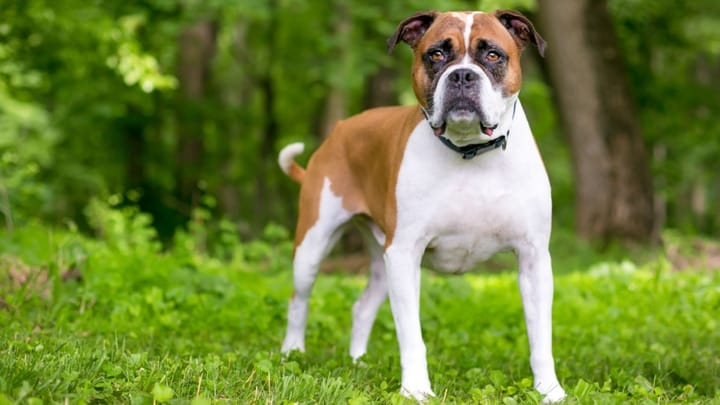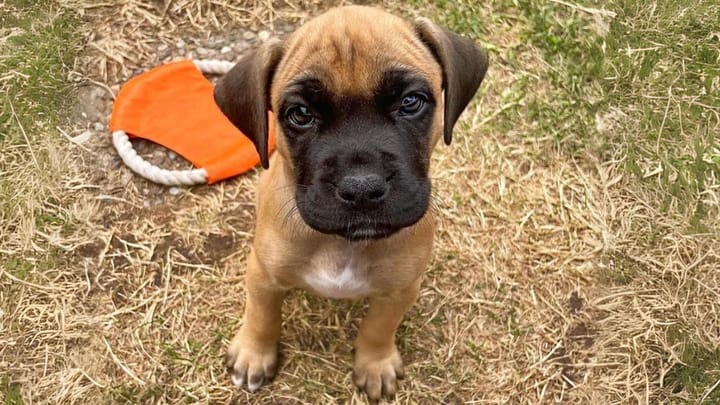Bullboxer
Other name: Valley Bulldog


A cross between the English Bulldog and the Boxer, the Bullboxer combines the robustness of the former with the energy of the latter. Bullboxers are dynamic, sociable and affectionate companions. With their deceptively imposing appearance, Bullboxers can actually make wonderful family pets, provided they're offered enough physical and mental stimulation on a daily basis.
The English Bulldog is an unusual dog, both in terms of physical characteristics and temperament. They're not very active dogs, but that doesn't mean they should lead a sedentary lifestyle. Bulldogs are very friendly with their family members. Loyal, protective, and courageous when necessary, they make wonderful companions. Their expression gives them a grumpy look - but on the inside, they are the happiest of pups!
Boxers are active dogs who make wonderful watchdogs and family companions. Considered one of the best babysitters of their species, they love children. Boxers make wonderful additions to active families. They'll take great joy in joining you on hikes or runs; especially since they don't like being left alone too much.

Bulldog
The English Bulldog is an unusual dog, both in terms of physical characteristics and temperament. They're not very active dogs, but that doesn't mean they should lead a sedentary lifestyle. Bulldogs are very friendly with their family members. Loyal, protective, and courageous when necessary, they make wonderful companions. Their expression gives them a grumpy look - but on the inside, they are the happiest of pups!

Boxer
Boxers are active dogs who make wonderful watchdogs and family companions. Considered one of the best babysitters of their species, they love children. Boxers make wonderful additions to active families. They'll take great joy in joining you on hikes or runs; especially since they don't like being left alone too much.
|
Life expectancy |
The Bullboxer has a life expectancy of between 10 and 12 years |
|
Temperament |
|
|
Size |
Medium
|
|
Adult size |
Female
Between 18 and 22 in
Male
Between 20 and 24 in
|
|
Adult weight |
Female
Between 44 and 66 lb
Male
Between 55 and 77 lb
|
|
Coat colour
|
Black White Brown Sand |
|
Type of coat
|
Very short |
|
Eye colour
|
Brown
|
|
Purchase price |
The Bullboxer costs between £700 and £1800 |
The Bullboxer is not recognized as a breed in its own right by the major canine organisations, but the crossbreed has been gaining popularity as a family dog, thanks to its protective and affectionate nature.
More details about the Bullboxer
Bullboxer: Origins and history
Bullboxers are a cross between two much-loved breeds, who were both very popular in England in the 19th century.
While the precise date is unknown, the crossbreed is thought to have been created in the 1900s.
The Bullboxer was bred as a companion dog, and has seen an increase in popularity in recent years. Clubs and associations have now been formed to promote and supervise the breeding of Bullboxers.
Bullboxer: Characteristics
Bullboxer: Behaviour
Training a Bullboxer
Bullboxers are usually intelligent and easy to train. They respond best to positive reinforcement and consistency from all members of the household.
Bullboxer: Lifestyle
Breed compatibility Bullboxer
Bullboxer: Purchase price
Bullboxers can cost anywhere between £700-£1,800, depending on the breeder and location.
In addition to the initial cost, you'll need to factor in expenses for veterinary care, pet insurance, food, accessories, vaccinations and de-worming.
Bullboxer: Shedding
Average
The Bullboxer's short coat requires little maintenance. Weekly brushing is advised to help reduce shedding.
Bullboxer: Health
Bullboxers are generally robust dogs, less prone to the health issues that can affect their parent breeds.
Bullboxers can struggle in extreme weather conditions, particularly when it's very hot. Intense exercise should be avoided during the summer months.
Bullboxers tolerate the cold better than the heat. Due to their short coats, they may need a coat as the temperature drops.
Without careful monitoring, Bullboxers can be prone to weight gain.
Bullboxers may be prone to certain hereditary diseases, including hip dysplasia and respiratory issues.
Ask your breeder for health screening records of both parent dogs. Regular veterinary check-ups will also be important as your Bullboxer ages, to help monitor for any health concerns.





